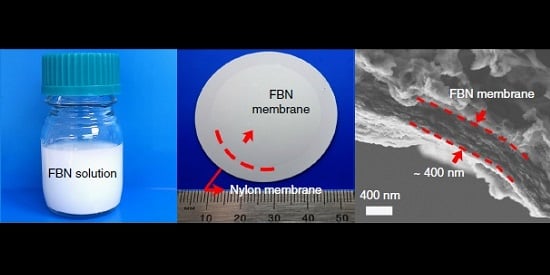Chemical filter membrane could be the future of water purification: Deakin research
Media release
Deakin scientists have used cutting-edge nanomaterials to create a "molecular sieve" capable of industrial-grade water purification.
Researchers from the Institute for Frontier Materials (IFM) made the filter with layered flakes of hexagon-shaped chemical compound boron nitride, creating a stable and highly-resistant membrane that can filter and block out more than 99 per cent of nanoparticles.
IFM Senior Research Fellow Dr Weiwei Lei said the membrane, which contains microscopic parts, could be used to provide clean drinking water, while also being effective at purifying organic solvents such as acetone and alcohol.
"Small molecules can pass through the nanochannels of the membrane, but the larger molecules and impurities are blocked," Dr Lei said.
"This forms an excellent filtration membrane, and it will be a good candidate for purification such as separating organic material and removing toxic dyes from water and organic solvents, which has huge potential for applications across water, chemical and pharmaceutical industries.
"The separation and recovery of organic solvents is a global problem for chemical and pharmaceutical companies, accounting for 40 to 70 per cent of operating costs.
"Any new efficient separation process or materials will minimize the cost and consumption of energy, which is in high demand now."
Dr Lei said it was the first time chemically stable boron nitride had been used to create a functional membrane, meaning it was much more effective than commercial filter membranes and others based on two-dimensional nanomaterials.
"Our new membrane has an adjustable thickness and high durability – and unlike commercial membranes currently on the market it is stable under harsh conditions, such as in acidic and basic solutions," he said.
"It also has more nanochannels for small molecules to pass through, offering unprecedented transport performance and filtering at levels more than 1500 times higher than those of commercial membranes."
The plasma and 2D materials team at IFM is an internationally recognised leader in plasma and 2D nanomaterials research.
Previous breakthroughs from Dr Lei and his collaborators have included a boron nitride nanosheet sponge capable of absorbing oil from water.
The full paper "Functionalized boron nitride membranes with ultrafast solvent transport performance for molecular separation" was published this week in the Nature Communications journal.
Co-authors include Dr Lei and IFM's Cheng Chen, Jiemin Wang, Dan Liu, Chen Yang and Yuchen Liu, as well as Rodney Ruoff from South Korea's Ulsan National Institute of Science and Technology.

